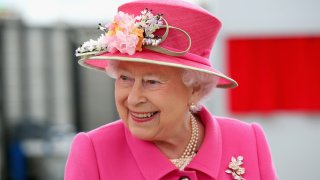
Queen Elizabeth II, who died Sept. 8 at 96, was in the public eye her entire life and wanted to make sure her subjects saw her — literally.
That's partly why she long wore festive, bright colors for her public appearances, according to royal expert Daisy McAndrew.
"She's quite small — so sometimes just quite difficult to spot — so her dressers ... decided some years ago that it would be helpful if she was brightly colored so that people could spot her easily," she said earlier this year.
But also, the queen had a famous motto: "You have to be seen to be believed," McAndrew said.
Get Tri-state area news delivered to your inbox. Sign up for NBC New York's News Headlines newsletter.
"In other words, now, that's more about getting out there and doing the job, but it does also lend itself to being seen literally by wearing bright clothes," she said. “And I think, finally, that it’s just a personal preference … she likes all the matching hats and all the rest of it.”
Entertainment News
A look back at photos of the royal's style throughout her life attests to her affinity for colorful clothes. As a head of state, Elizabeth visited all corners of the Earth — and typically with flair.
There are countless examples of this trend. For a walkabout during her Silver Jubilee in 1977, Elizabeth wore a flowing pink dress with a matching jacket and hat.
For a visit to the Great Wall of China in the late 1980s, she wore a tailored skirt suit in purple.
And in the early 1990s, she chose a bright green look on a state trip to Reykjavik, the capital of Iceland.
In the 2016 documentary "The Queen at 90," Sophie, Countess of Wessex, explained what it was like to be a part of the royal family's public appearances with the longstanding monarch.
"When you realize that people have actually turned up to say hello and they want to say hello, and they're pleased to see you, it's very heartwarming, really," Sophie said. "Actually to stand back and watch the sheer pleasure on people's faces as they get to be able to say hello to the queen is wonderful. Just a look or a nod or a smile and hello — they're absolutely thrilled."
Sophie's husband — Prince Edward, Earl of Wessex, and the youngest son of the queen — added that they loved watching his mother work a crowd.
"Without a shadow of a doubt, one of the best entertainments is being in the car behind the queen's car," he laughed. "That's when you see all the reactions, especially places where they're not expecting to see the queen."
An analysis done by Vogue in 2012 showed the queen most often wore blue that year, though McAndrew said earlier this year she believed the royal is "more into pink and red now."
"She's gotten very into lime green recently as well," McAndrew said. "I suspect that she probably got persuaded into wearing it and then probably had a lot of compliments."
The queen's senior dresser, Angela Kelly, had worked for the royal since 1994. In Kelly's 2019 book, "The Other Side of the Coin: The Queen, the Dresser and the Wardrobe," she explained that many of the monarch's outfits were designed and made in-house. In designing the royal's outfits, Kelly said she used locally purchased fabrics, gorgeous belts of cloth purchased while traveling, and occasionally fabrics gifted to the monarch.
"Colour is key though — the colour chosen must suit the Queen and the occasion," Kelly wrote. "Vibrant colors work well in the daytime: they allow her to stand out from the crowd and be visible to the well-wishers who have come to see her."
As it is likely to rain in England, the queen also had a collection of clear umbrellas with every possible color trim to match her outfits, Kelly said.
“If it is raining, she will use one of the many transparent umbrellas she has...which ensures that, even in the wettest conditions, she remains as visible as possible,” Kelly wrote.
Kelly added that the queen also chose her hats to match the occasion for each event.
"For example, when Her Majesty visits a school or a children’s centre, she is always dressed in a bright, jolly colour, and her hat has the kind of details that will appeal to children — feathers, twirls, twists, flowers, and ribbons," Kelly wrote. "When she visits a nursing or residential home for older people, she prefers to wear a strong, well-defined colour, with a structured hat, to help those who are visually impaired to see her."
McAndrew speculated that the queen also just "doesn't want to look like she’s wearing depressing colors," but added the "main thing is about standing out."
"So if people have waited to see her, they don't feel like it was a wasted trip," she said. "But certainly the bigger the crowd, the brighter the clothes."
This story first appeared on TODAY.com. More from TODAY:



